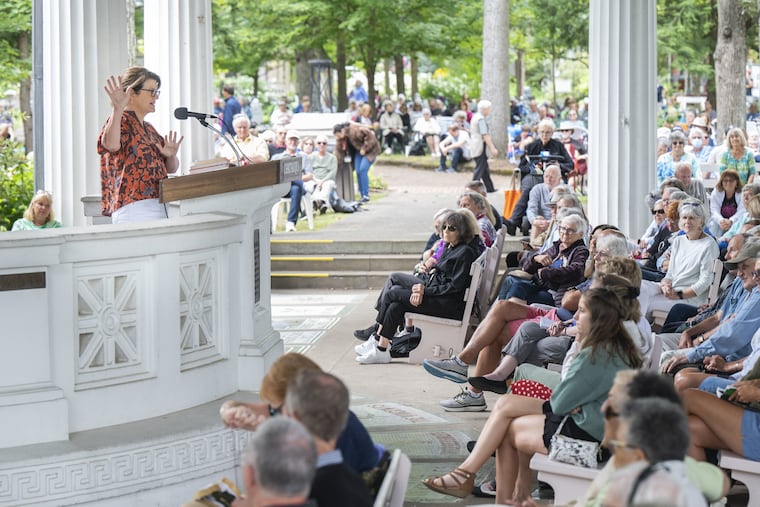I spoke at the event where Salman Rushdie was stabbed. It was harrowing.
I had to leave just before his session. I don’t know what he would have said. None of us do. Instead we know something else.

“Vigilance is expensive,” the neuroscientist Lisa Feldman Barrett once told me, using a budgeting metaphor to describe how the brain manages the systems of our body.
Maybe that’s why it felt so freeing to be at Chautauqua, in western New York, last week, even considering I was there to deliver a speech to 1,400 people, an audience size that would rile me up in other circumstances. But there, on the lake, I found it too peaceful to panic about public speaking. Too lovely and warmhearted.
For nine consecutive weeks every summer, an intergenerational community strolls, bikes, and shuffles around the paths of the Chautauqua Institution listening to Pulitzer Prize winners, presidents, and much lesser known people like me. The key word is listening. The people come to be expanded by new ideas and a mix of perspectives, to be changed.
My speech was on Tuesday. As the host of PBS’s Tell Me More and the podcast Kelly Corrigan Wonders, I addressed an audience of well-intentioned, interfaith, lifetime learners in an outdoor theater in St. Paul’s Grove called the Hall of Philosophy. The theme for the week was Redefining the American Home and my prompt was: What is home and what could it be? I described a certain progression I’d noticed as people come to feel at home in a school, a neighborhood, a job, a region, or a country. The lowest level of comfort is you are allowed here, which can give way to you are welcome here, which might eventually become you belong here — and, in the best case, this is yours.
Salman Rushdie’s speech was on Friday.
I had to leave just before his session. I don’t know what he would have said about home. None of us do. Instead we know something else.
A man from New Jersey took to the stage and stabbed Rushdie multiple times. The author was rushed to an emergency room and suffered a damaged liver, severed nerves, and is likely to lose an eye.
» READ MORE: Salman Rushdie ‘on the road to recovery,’ agent says
We know that there are still people — some barely born when the fatwa was put out against Rushdie for a made-up, magical story he wrote — who are deeply at home with violence anywhere, anytime, by any means. We know that longtime residents of Chautauqua who want nothing more than to pour you a glass of iced tea and give you the chair on the porch with the best view, feel less at home in their homes than they did a week ago, joining so many Americans who live in a unending state of vigilance.
And what does it say about our shared communities that Rushdie, on the day he was set to speak about home and belonging, was shown he was utterly unwelcome by a fanatic hurtling toward him from behind with a knife? As an author who’d just left the grounds, I instantly connected with writer friends, many of whom had been to ideas festivals of this sort over the years. I don’t know what it says about our collective naivete or romantic outlook, but to a person, we were shocked. There should be safe spaces for sharing, comparing, debating ideas, we agreed.
“Will every seminar, college, and institute begin pricing out metal detectors and posting job openings for security?”
What will happen to this place and all others like it? we wondered. Will every seminar, college, and institute begin pricing out metal detectors and posting job openings for security? Will armed guards ring the squares where banjo players practice while kids do cartwheels and poets mix with public policy wonks? (I’m not waxing poetic. Chautauqua is that idyllic.)
And that’s what’s so shattering. Who can feel safe moving around the world with nothing but a few pages of writing and some hopes for society? Not Salman Rushdie, whose recovery we are all attending to as if he were a beloved uncle.
Vigilance is expensive. Every one of us in every community across the country needs places to let our shoulders relax, to feel we belong, to release. And we may have just lost a particularly good one.
Kelly Corrigan is the author of four New York Times bestsellers and the host of the podcast Kelly Corrigan Wonders on WHYY as well as the PBS interview series Tell Me More, also on WHYY.